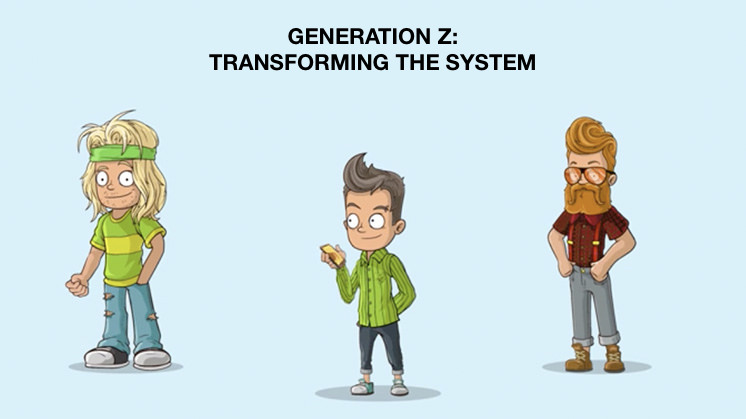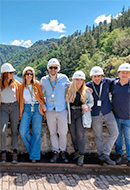Characteristics of generations X, Y and Z
From the baby boomer to the post-millennial generations: 50 years of change
The photographer Robert Capa coined the term 'generation X' to refer to people born after the 60s. In not even half a century, this generation has coexisted with three others: the baby boomer, Y and Z. Find out what the characteristics of each generation are.
Generation X, Y and Z: changing the established order. Video voice transcription [PDF]
The group of young Europeans who posed for Robert Capa could not have known that they were going to be considered part of Generation X, the title given by the photographer to a series of photographs in which he wanted to capture what life was like for the young people who grew up after the Second World War (1939-1945).
Generation X includes those born between 1965 and 1981, during the reconstruction of Europe after the war. Their life has not been easy, since, after a period of upheaval, finding a job was a great challenge. To work and produce was their philosophy of life, leaving no room for idealism. Individualism, ambition and an addiction to work — or being a workaholic — are the values with which they grew up.
The parents of this generation had the worst part: they lived through the postwar period. They are the Baby boomers — born between 1945 and 1964 — and they are called this because they were born during the baby boom, the period in which the birth rate shot up in a number of Anglo-Saxon countries, above all the United States, Canada and New Zealand, after the end of the Second World War.
This generation was to be envied as they experienced all that young people would have wanted to at that time. They saw how John Lennon, Paul McCartney, George Harrison and Ringo Starr came together to form The Beatles in 1962. They also experienced the landing of a man on the Moon (1969), the soccer players Pelé and Maradona at their best and the fall of the Berlin Wall on 9 November 1989.
They went through the entire period of technological evolution and the rise and development of the media, as well as enjoying stability in terms of both work and family and being active both physically and mentally. In spite of having adapted to a world ver. 4.0, they are less dependent on smartphones than the next generations.
What characterises each generation?
Generation Y or the Millenials: digital natives
The revolution was shaped by the millennials or generation Y. Also known as digital natives, millennials are those born between 1982 and 1994 and technology is part of their everyday lives: all their activities are mediated by a screen. The concept of on and off is completely integrated into their lives. However, they were not born into it; they migrated to the digital world from the analogue one in which they were living.
Unlike previous generations, because of the economic crisis, the world requires them to be better trained to get a job, as competition is increasing. Unlike their parents, Generation X, digital natives are not satisfied with the world around them and are ambitious and want to achieve their goals.
However, the millennial generation is labelled as being lazy, narcissistic and spoilt. In fact, in 2014, Time magazine labelled them as the me-me-me generation.

Nomophobia: fear of being without a mobile phone
Excessive use can lead to problems of dependence, addiction and fear.

Generation Alpha will lead a digital world
Generation Alpha includes those born from 2010 onwards

Coworking: the workspace revolution
Shared offices have become dynamic melting pots of professionals from diverse disciplines
Characteristics of the Z or Centennial generation
Aged between eight and 23 years old, generation Z or the post-millennial generation will take the lead in a few decades. Also labelled as centennials, for having been born into the world at the turn of the century — the oldest were born in 1995 and the youngest in 2010 — they arrived with a tablet and a smartphone under their arms.
But what is Generation Z? It is a group of people that is marked by the Internet. It is part of their DNA: it storms into their homes, their education and their way of socializing. And if Generation Y has difficulty finding a job, the situation for post-millennials is even worse.
Their mastery of technologies may make them neglect their interpersonal relationships to a greater extent, but they are the ones who give more of a voice to social causes on the Internet. They like to get everything they want immediately, a fact fostered by the digital world in which they are immersed, and their lifestyle is also influenced by youtubers.
They multi-task, but their attention span is limited. They are independent and demanding consumers and will have jobs that do not exist in today's world.
Despite today's social diversity, generations Y and Z predominate. According to the study New Kids On The Block. Millennials & Centennials Primer by Bank of America Merrill Lynch, today there are 2 billion millennials and 2.4 billion centennials, representing 27% and 32% of the world population, respectively.
As for the current generation, those born after 2010, they have been termed the Alpha generation. What will their behaviour be like? In a couple of years, we will see if we notice the generation gap!










